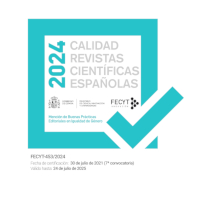Mythpolitics of the "mexican cantares" from José Emilio Pacheco
DOI:
https://doi.org/10.18172/cif.2747Keywords:
José Emilio Pacheco, Mexican poetry, Symbolic cultural goods, Prehispanic mythAbstract
This article carries out a return to the poetry of José Emilio Pacheco with particular interest in the relationship from this with the “culturalismo mexicanista”, the idea of nation and with the use of some symbolic cultural goods of indigenous character, where stand prehispanic myths and symbols of the so called Aztec culture. Generally speaking, what is argued is that the poetry of the Mexican, rather than establishing continuity with ‘criollomestizos’ literary artifacts, that built national culture from the use and abuse of an indigenous glorious past, set a break point, promoting versions history from apocalyptic stories. This is made from the practice of an idea of intertextuality that interwove the Nahua myths itself with universalizing toils, and with translated versions of these myths and through links to the most widespread codices. This action what it seeks is to presage the fall of the contemporary Mexican construct in the inevitable crisis.Downloads
References
DOUDOROFF, M. (1994). “José Emilio Pacheco: recuento de la poesía, 1963-86” en José Emilio Pacheco ante la crítica. (Selección y prólogo Verani, Hugo J.). México DF: Ediciones ERA.
GORDON, S. (1990). “Los poetas ya no cantan ahora hablan (Aproximaciones a la poesía de José Emilio Pacheco)”. Revista Iberoamericana 150 (LVI): 255-266. DOI: https://doi.org/10.5195/reviberoamer.1990.4683
MIGNOLO, W. (2007). La idea de América Latina. La herida colonial y la opción decolonial. Barcelona: Gedisa.
MILLARES, S. (2003). “José Emilio Pacheco: poesía y disidencia” en La literatura iberoamericana en el 200. Balance, perspectivas y prospectivas. Actas del XXXIII Congreso del IIL. (Coord. C. Ruíz). Salamanca: Universidad de Salamanca.
OVIEDO, J. M. (1995). Historia de la literatura hispanoamericana. Madrid: Alianza Editorial.
PACHECO, J. E. 1963 (2000). Los elementos de la noche. México DF: Ediciones Era.
PACHECO, J. E. (1966). El reposo del fuego. México DF: Fondo de Cultura Económica.
PACHECO, J. E. 1969 (1996). No me preguntes cómo pasa el tiempo. México DF: México DF: Ediciones Era.
PACHECO, J. E. 1976 (2006). Islas a la deriva. México DF: México DF: Ediciones Era.
PACHECO, J. E. (1980). Tarde o temprano. México DF: Fondo de Cultura Económica.
PONIATOWSKA, E. 1971 (1975). La noche de Tlatelolco. México DF: Ediciones Era.
ZABALGOITIA, M. (2013a). Fantasmas de la nueva palabra. Representación y límite en literaturas de América Latina. Barcelona: Icaria.
ZABALGOITIA, M. (2014). “Pedro Páramo de Juan Rulfo: tiempo y decir míticos o hacia una tercera continuidad mexicana” en Palimpsestos de la antigua palabra. Inventario de mitos prehispánicos en la literatura latinoamericana. (Ed. H. Usandizaga). Oxford: Peter Lang.
ZABALGOITIA, M. (2015). “Esto que ves ya no existe: mitos y embrujos en literaturas del norte de México” en Fragmentos de un nuevo pasado. Inventario de mitos prehispánicos en la literatura latinoamericana actual. (Ed. H. Usandizaga y B. Ferrús). Oxford: Peter Lang.
Downloads
Published
How to Cite
Issue
Section
License
The authors retain copyright of articles and authorize CIF the first publication. They are free to share and redistribute the article without obtaining permission from the publisher as long as they give appropriate credit to the editor and the journal.
Self-archiving is allowed too. In fact, it is recommendable to deposit a PDF version of the paper in academic and/or institutional repositories.
It is recommended to include the DOI number.
This journal is licensed under a Creative Commons Attribution 4.0 International License














